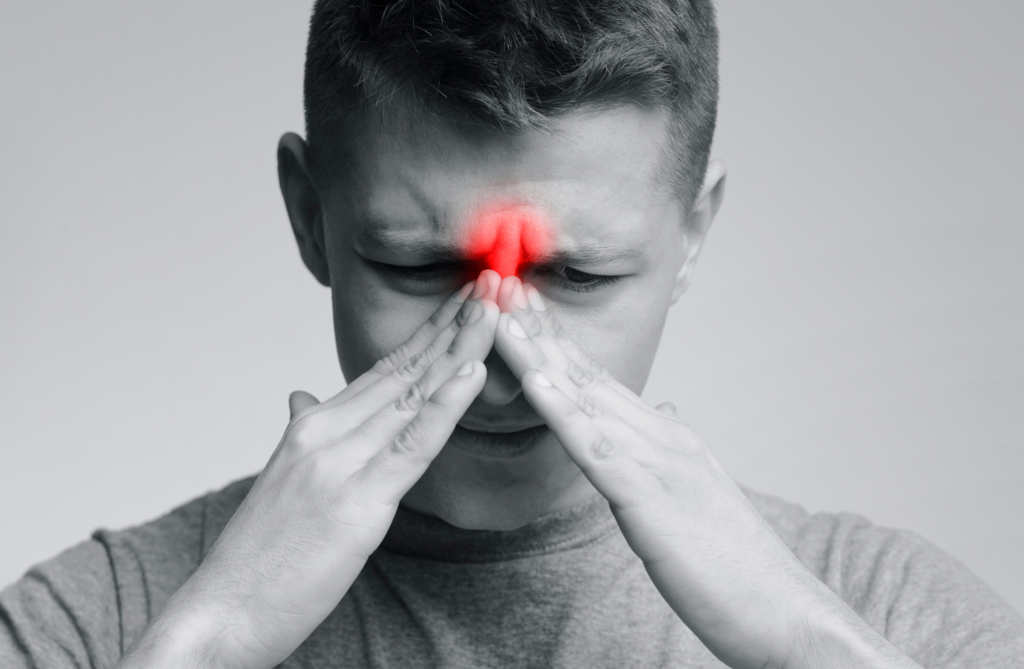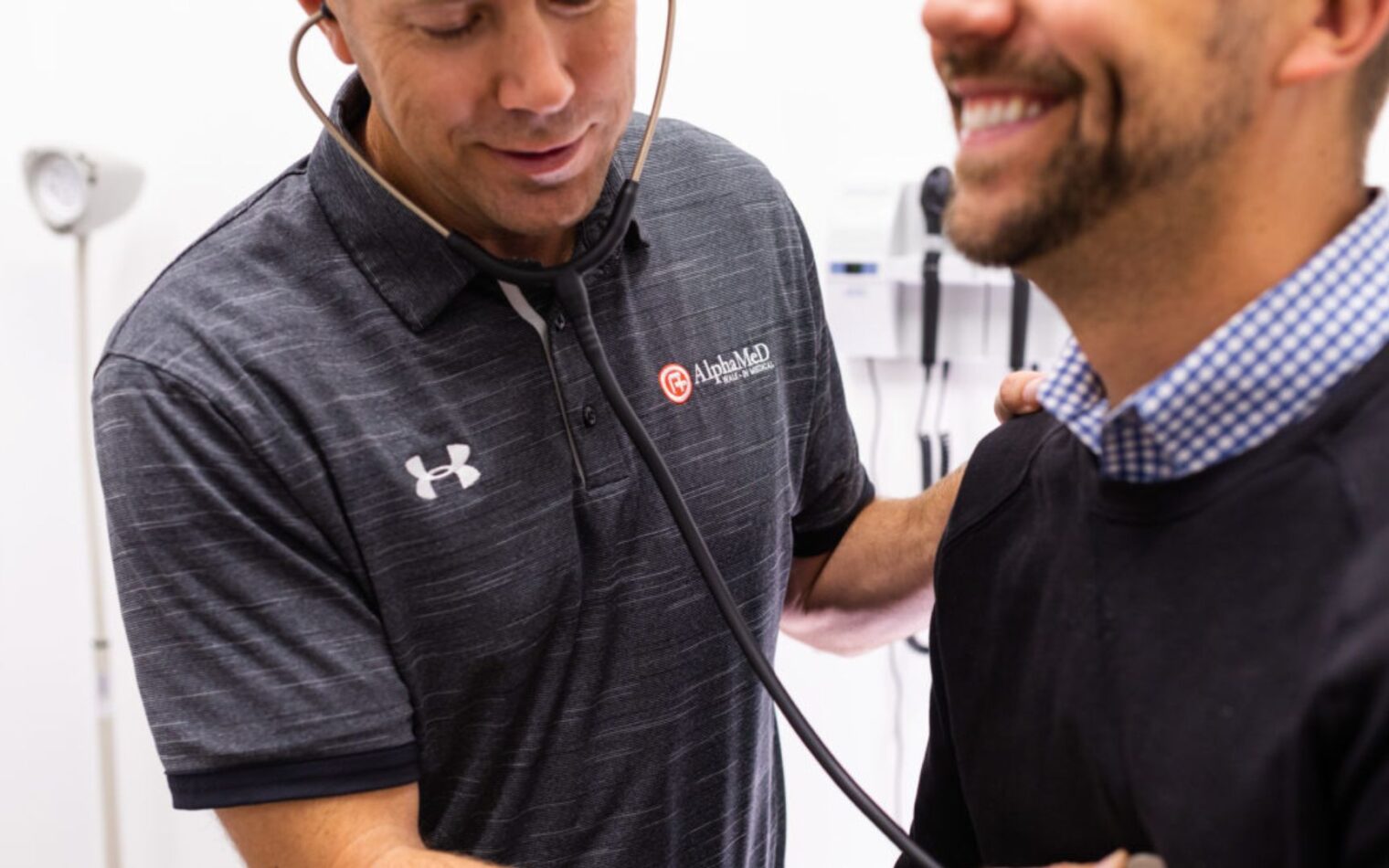The upper respiratory tract is the section of your respiratory system that resides above your lungs. It includes your nose, sinus cavities, and nasal passages. The upper respiratory tract is responsible for filtering the air you breathe in, trapping impurities, and releasing clean air back out again. If you have an upper respiratory infection (URI), it means that either your nasal passages or one of your sinus cavities have been infected with a virus, bacteria, or other microorganisms. These infections are extremely common; According to the CDC, more than 10 million Americans experience some type of acute viral upper respiratory infection every year. They’re also no joke, these infections can be painful and cause you to miss work or school. Here are some signs that you may have a URV and their most common causes, treatment methods, and remedies.

Symptoms of a URI
Common side effects of a URI:
- Diarrhea or constipation.
- Shortness of breath or chest pain.
- Shortness of breath and fever.
- Nasal congestion or sore throat.
- Nausea and/or vomiting.
- Chest pain that may be severe (like a heart attack).
- Fever.
- Weakness in the upper body (like an attack from vertigo).
The symptoms don’t have to be present for you to have an Upper Respiratory Infection. The symptoms can be present if you have chronic sinusitis or an infection in your nose or sinuses that obstructs your nose and/or mucous membranes. If you have an infection in your nose, it’s usually caused by something other than a virus or bacteria. Infections like these can lead to pneumonia and can be serious, especially if you have a weakened immune system. Treatment options for nose infections include antibiotics, anti-inflammatory drugs, and nose sprays. You can also try home remedies like steaming your nose, increasing humidity, or inhaling essential oils. Eating a healthy diet, maintaining a nutritious weight, and avoiding certain foods can help strengthen your immune system and reduce your risk of infections. Here is a list of some of the common signs and symptoms of a URI.
Signs of an Upper Respiratory Infection
If you have a URI, you’ll likely experience several symptoms. These may include:
- Sneezing: Sneezing is your body’s attempt to clear out any irritants or pathogens (disease-causing microorganisms) from your nasal passages.
- Running nose or stuffy nose: This is caused by excess mucus production in your nasal passages.
- A sore throat: Your throat is lined with mucus membranes and is a very common site for viral or bacterial infections.
- Average or above-average fever: Your body’s way of fighting off an infection.
- Fatigue: Your body’s way of telling you that it needs rest.
- Headaches: Often the result of inflammation in the sinuses.
- Pain in your upper jaw: Many viral and bacterial infections cause swelling, which can cause pain in your upper teeth.
- Swollen lymph nodes in your neck: Swollen lymph nodes are often the result of an infection.

Rhinitis VS Sinusitis
Rhinitis
Rhinitis is an inflammation of the nasal passages that can be caused by either allergies or a viral infection. If you have rhinitis caused by allergies, you’ll experience itchy, watery eyes and a runny nose. If you have viral rhinitis, you’ll probably experience a stuffy nose along with a headache or pressure in your head. To determine the cause of your rhinitis, book an appointment at one of our nearest urgent care clinics, we can take walk-ins as well. In all cases, we do a thorough exam and test of your entire nasal passage and test. Be sure to drink plenty of water to stay hydrated. Stay away from tobacco products, which can irritate your nasal passages. And keep your home free from allergens to help prevent allergic rhinitis.
Sinusitis
Sinusitis is an infection in one or more of the sinuses. It can be caused by allergies or by bacteria. Viral infections are rarely responsible for causing sinusitis. Symptoms of sinusitis include facial pain or pressure (especially around the eyes and cheeks), a thick or yellow mucus discharge from your nose, and an increase in the amount of mucus that you normally produce. Bacterial infections are treated with antibiotics, but viral infections are not. Antibiotics are used to treat bacterial infections, but not viral ones. It is always best to come into your closest AlphaMeD urgent care and get a thorough example to determine the best treatment plan for your situation.

Common Causes of URIs: Rhinovirus and Other Viruses
Rhinovirus (the most common cause of URIs) causes an infection that affects your upper respiratory system, but not your lower respiratory system (i.e., your lungs). Because rhinovirus doesn’t affect your lungs, it’s not contagious (you can’t pass it to someone else). Rhinovirus is very common in the winter when people spend more time indoors. Signs and symptoms of a rhinovirus infection include a runny or stuffy nose, a sore throat, and the common cold. Other viruses that can lead to URIs include adenovirus, coronavirus, parainfluenza, influenza, human respiratory syncytial virus (a type of flu virus), cytomegalovirus, Epstein-Barr virus, and more. The good news is that most of these viruses are short-lived and aren’t likely to linger around in your system for longer than a few weeks.
Common Causes of URIs: Bacterial Infections
A bacterial infection can cause a URI. Bacterial infections are more serious than viral infections and can linger in your system for longer. Viral infections often go away on their own, whereas bacterial infections often require antibiotics. The bacteria that are most responsible for causing URIs are Streptococcus, Haemophilus, and Staphylococcus. When you come to visit AlphaMeD urgent care we will perform a series of tests and if you have a bacterial infection, we will most likely prescribe antibiotics. Make sure that you finish the entire course of antibiotics, even if you feel better because stopping too early can lead to antibiotic resistance.
Common Causes of URIs: Allergic Reactions
An allergic reaction can cause inflammation in your nasal passages and sinuses. Allergic reactions are often triggered by pollen, dust, or pet dander. Many people with allergies also experience rhinitis, which causes a runny nose or stuffy nose. Some people with allergies find that their upper respiratory system becomes inflamed even when they don’t come in contact with the things that usually trigger their allergies. If you experience an allergic reaction, you may notice that your nose is runny, but your mucus is clear or yellow. You may also experience a scratchy throat, an itchy nose, or even sneezing. To treat an allergic reaction, you can take over-the-counter allergy medications or allergy-specific medications. However, it’s always extremely difficult to self-diagnose an infection vs. an allergic reaction. This is why it is always best to make an urgent care visit so that we can perform the necessary tests, determine the correct diagnosis, and get you on the proper treatment plan.
In Summary …
An upper respiratory infection is the most common type of infection, affecting the nasal passages and sinuses. Rhinovirus is the most common cause of URIs, but it can also be caused by bacterial infections, allergic reactions, and more. If you have a URV, you may experience several symptoms, including sneezing, a runny nose, a sore throat, a stuffy nose, average or above-average fever, fatigue, headaches, pain in your upper jaw, and swollen lymph nodes in your neck. In any case, the best course of action is to come into your nearest urgent care and get a proper diagnosis so that you can get the right kind of treatment to get you back in top shape as soon as possible. As always we are here to help! Call us anytime with any questions or concerns you have about respiratory issues or any kind of illness. We are committed to providing our Arizona neighborhoods with a better healthcare experience.










